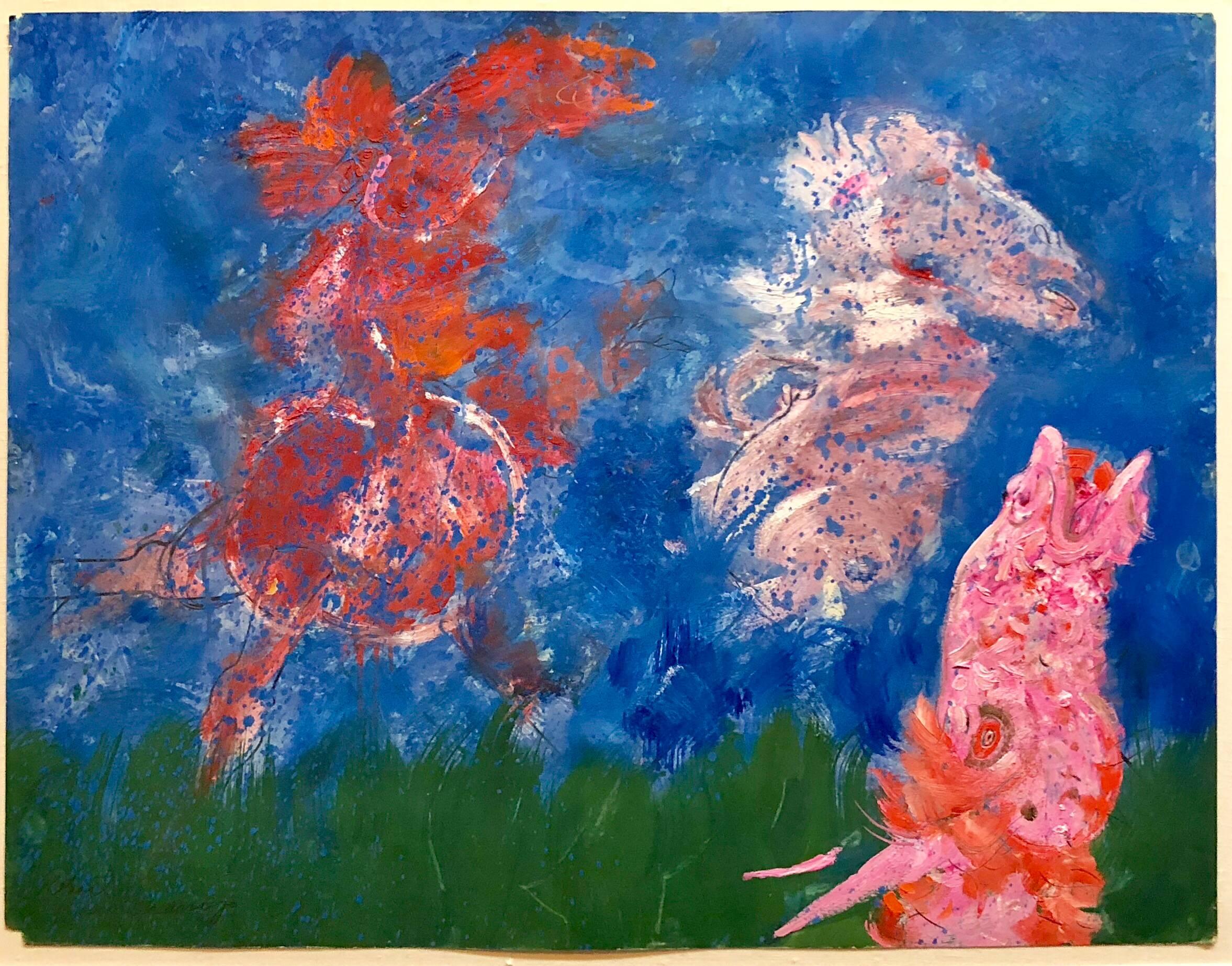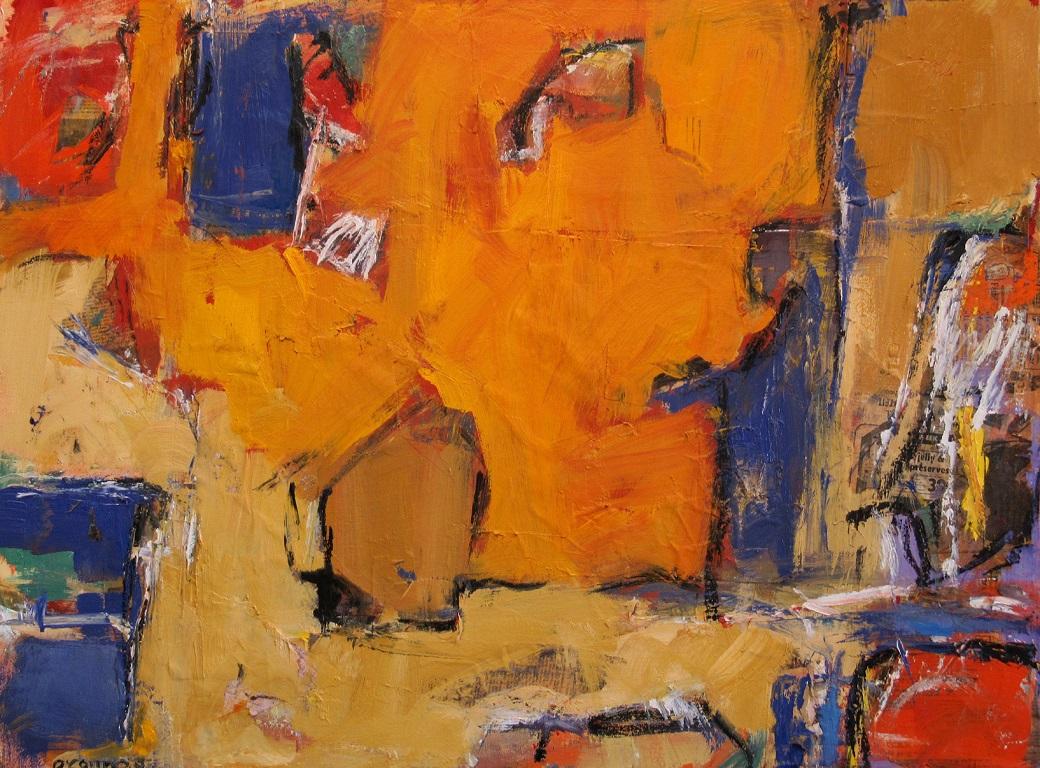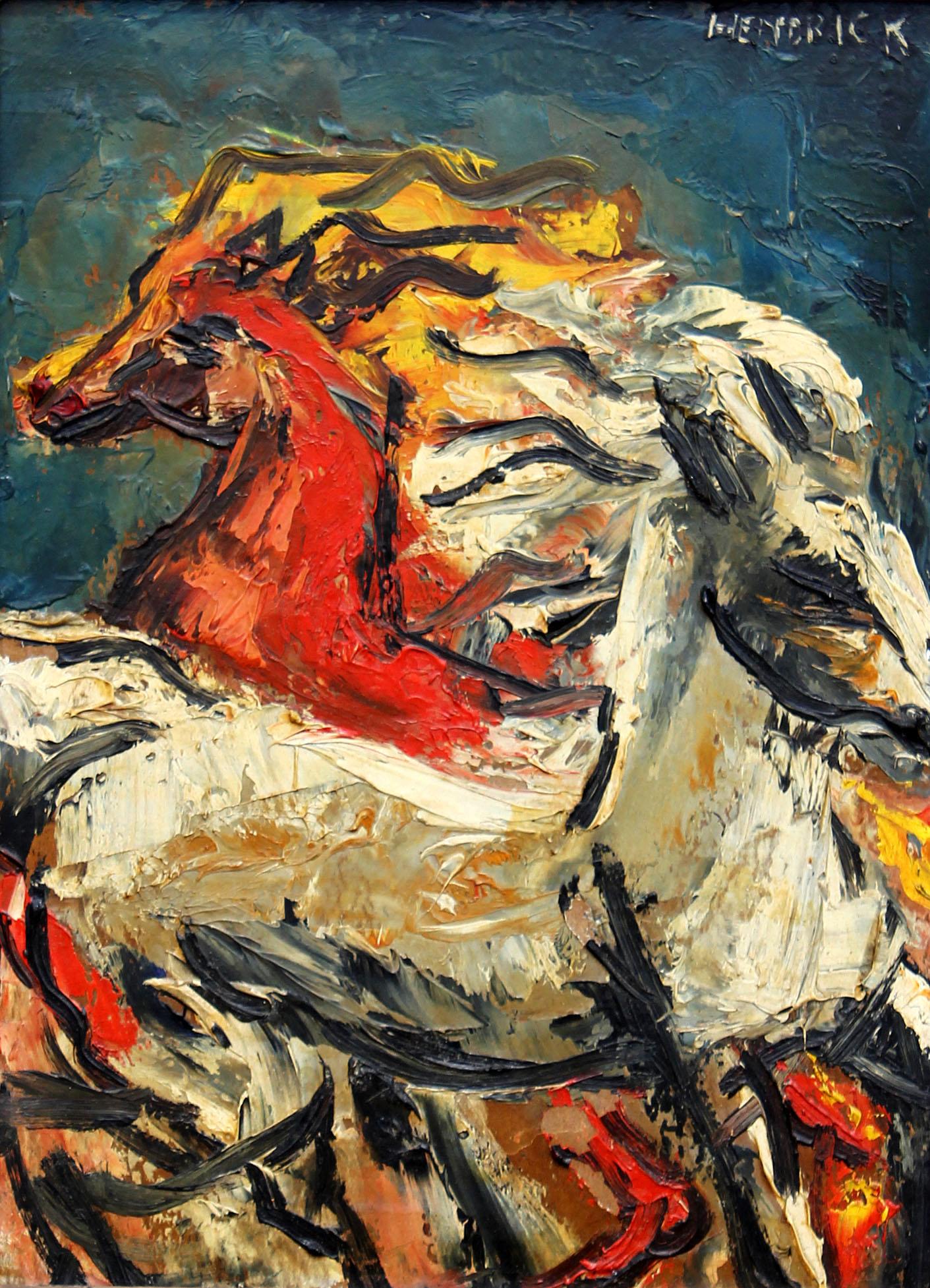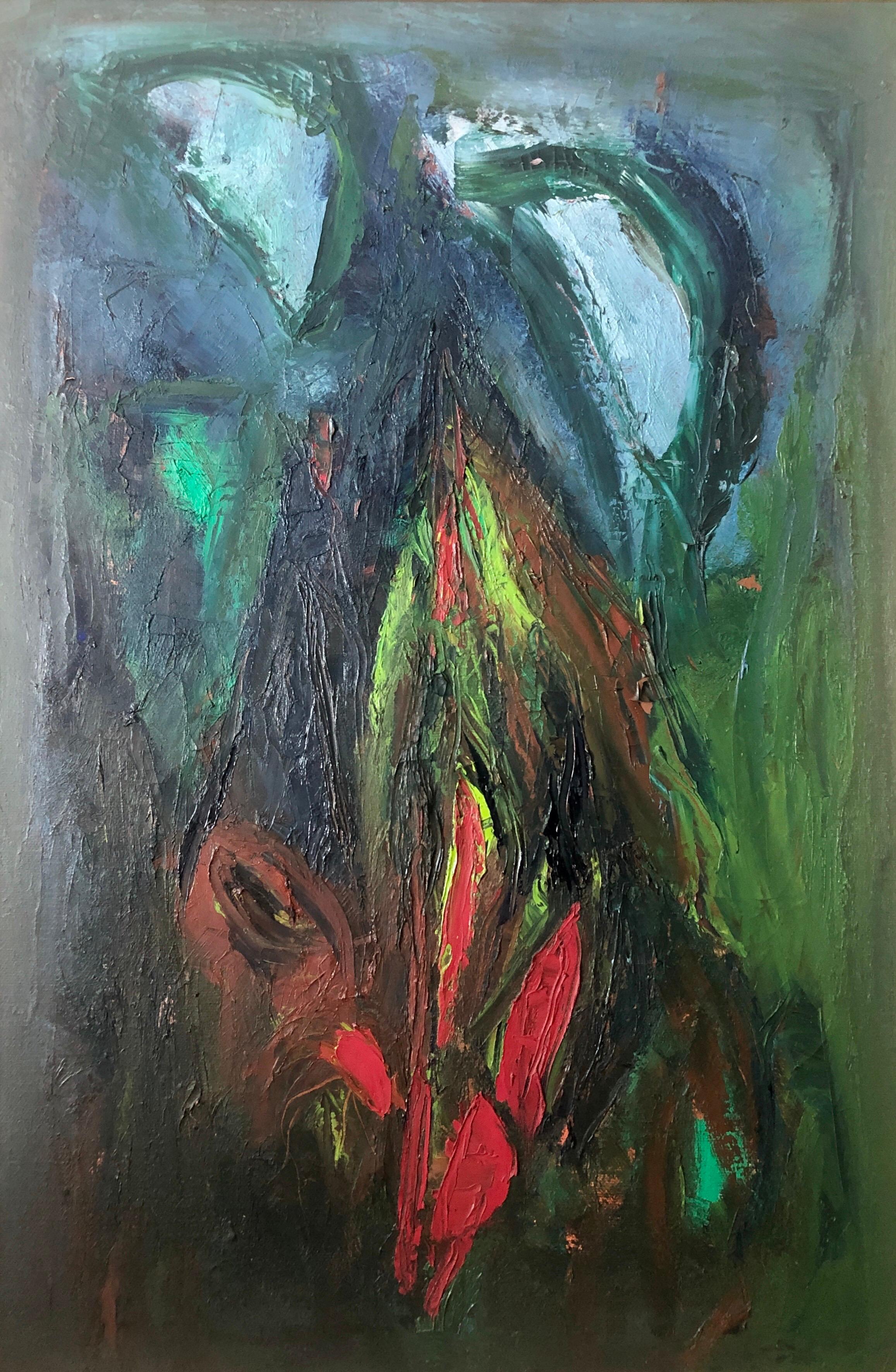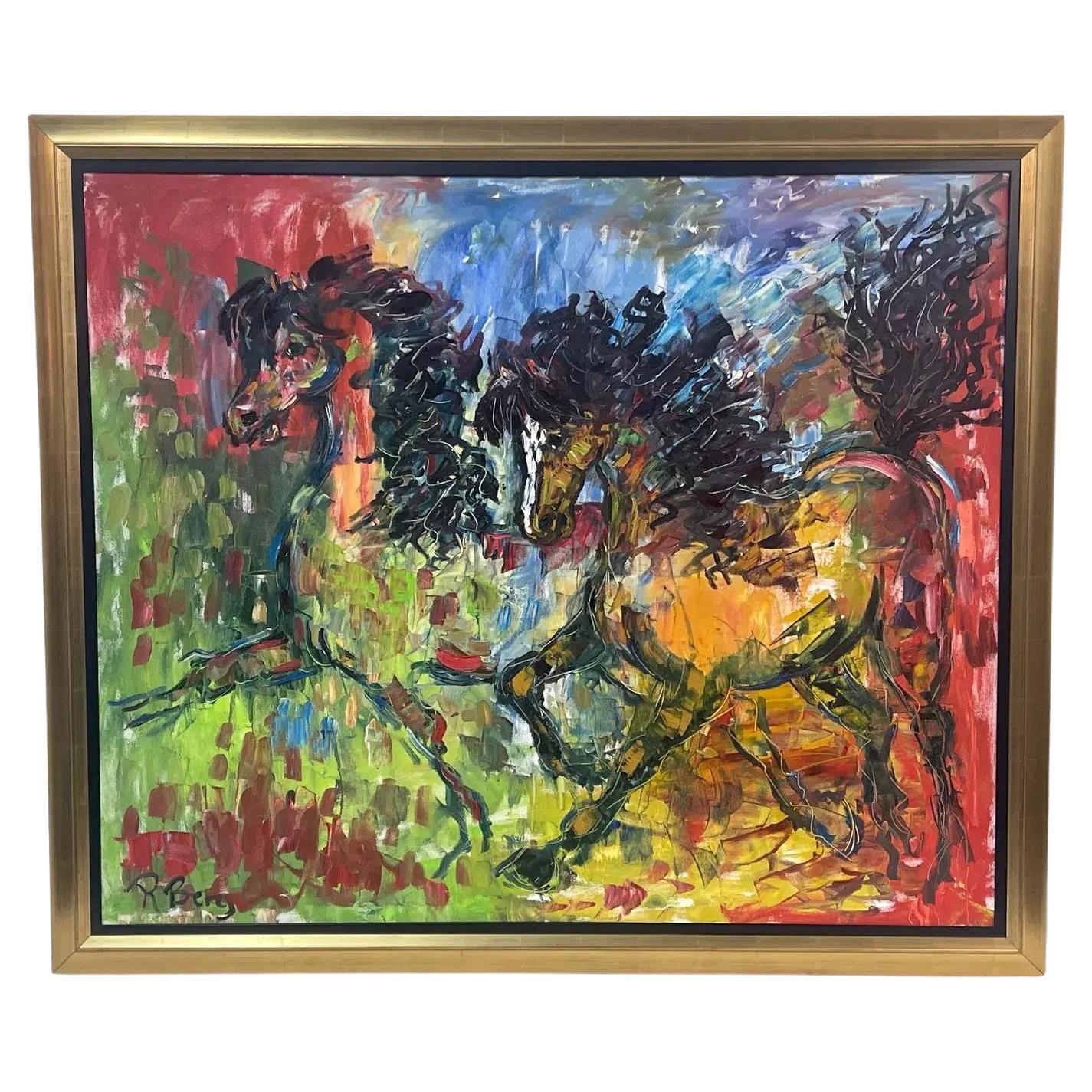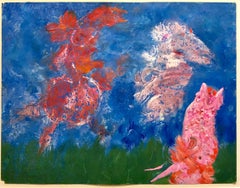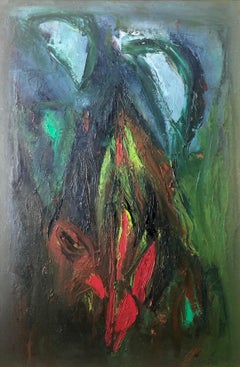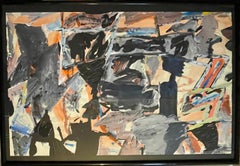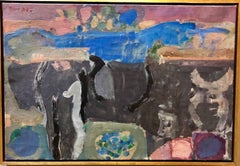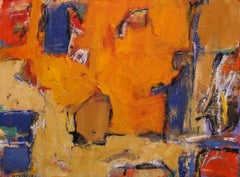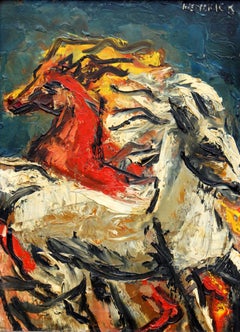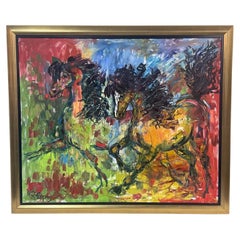Items Similar to American Neo Expressionist "Wild Horses" Modernist Oil Painting
Want more images or videos?
Request additional images or videos from the seller
1 of 11
Robert BeauchampAmerican Neo Expressionist "Wild Horses" Modernist Oil Painting
$2,800
£2,114.26
€2,452.98
CA$3,934.88
A$4,384.01
CHF 2,288.66
MX$53,227.74
NOK 28,766.98
SEK 27,191.78
DKK 18,311.17
About the Item
Robert Beauchamp (1923 – March 1995) was an American figurative painter and arts educator. Beauchamp's paintings and drawings are known for depicting dramatic creatures and figures with expressionistic colors. His work was described in the New York Times as being "both frightening and amusing,". He was a Guggenheim Fellow and a student of Hans Hofmann.
Robert Beauchamp was born in Denver, Colorado in 1923. He had three brothers and three sisters, and the children were orphaned by both parents by the time Beauchamp was three. The family grew up impoverished due to the Great Depression, living in a community house with other families. As a child he dabbled in art but it wasn't until high school that he began taking art classes. When not creating art he also played sports; football and basketball, and enjoyed chemistry and geology.
He was told he was good at drawing, and replaced study hall classes with art classes, receiving instruction and inspiration from a Welsh teacher named R. Idris Thomas. While in high school Beauchamp would go, every Monday, to the public library and a local museum where he would read books about art; specifically French painting, as assigned by Thomas. Beauchamp absorbed the tenets of European Modernism and American Abstract Expressionism—with which he eventually broke. While abstraction, with its focus on color and form, underlies his compositions, he filled canvas and paper with psychologically acute portraits of himself and others, nudes, animals, and objects of all kinds. Beauchamp would spend upwards of four hours a day in the art room and eventually won the Carter Memorial Prize, which provided a scholarship to the Colorado Springs Fine Arts Center. At Colorado Springs he studied under Boardman Robinson, painting landscapes in nature.
Beauchamp eventually joined the Navy and then returned to Colorado Springs to continue his studies. Traveling the world as an Armed Guard, he spent a year and a half at sea and the rest of the three years in San Francisco. Seeking to make money, and to follow his love for a girl, Beauchamp decided to attend Cranbrook Academy of Art from 1947–1948. There he studied pottery, believing one could "make more money selling pots than you could selling paintings." He described his experience at Cranbrook as intimidating and claustrophobic, and eventually switched to sculpture before switching to painting.
Beauchamp moved to New York City in the early 1950s and was involved in the Tenth Street galleries, which provided outlets for more experimental artists and the second generation of abstract expressionists. Despite his involvement with 10th Street and friendships with abstract artists, abstract art never interested in him. He showed at numerous galleries in New York and Provincetown, socializing with gallery owners, artists and collectors. His first exhibition was at the Tanager Gallery in New York, he also showed during the 1950s at the Hansa Gallery. In New York and Provincetown he studied under Hans Hofmann Eventually he felt that abstract expressionism became dull and stalemated.
During the 1960s he showed at the Green Gallery. C. 1960 he was awarded a Fulbright Award allowing him to travel to La Romola, Italy. He traveled frequently to cities such as Rome and worked constantly. Beauchamp returned to the states and lived in Provincetown at Walter Gutman's house, who awarded Beauchamp a grant. That year he met his future wife, Nadine Valenti, whom he married in 1967. Beauchamp taught at a variety of schools during his lifetime including Brooklyn College, School of Visual Arts, Cooper Union and the Art Students League of New York during the last fifteen years of his life.
Beauchamp described his drawings as painterly, seeking the spontaneity in an image. He would develop a drawing then a painting, and vice versa. His heavily impastoed paintings, often described as sculptures themselves, came from the pouring of paint from a can, with little planning and constant evolution in the medium upon the canvas. He preferred little planning to his creations, believing that an artists work would become stale and repetitive with constant planning.
He also created large scale works, at times 70 inches long. Beauchamp had little intention of ever selling his large works, preferring to create them due to the slow and intense experience he received from the process. The large drawings he created on the floor, and the smaller works were created on a table. Paintings were created on either the floor or wall and he described his painting process as "splattering", "pushing the paint around," and sponging.
Animals often appear in his paintings, despite a dislike for domestic animals outside of his artistic creations. He called the characters in his paintings as Beauchamps. Some Beauchamps hold meaning, with Beauchamp rarely sharing the meaning behind the symbols and characters. He made up the creatures himself, seeking to emphasize the character of each.
In 2006 the University of Massachusetts Amherst College of Visual & Performing Arts hosted an exhibition of Beauchamp's pieces from the 1960s, curators stated that Beauchamp's work: "effortlessly blends innovative style elements with narrative, descriptive images. One senses equal enjoyment in the manipulation of, and interaction with, color and paint, and the often sudden and unexpected presence of a wasp or a lump of sugar."
included in the important exhibit "Twelve New York Painters." New York: David Findlay Jr. Fine Art with Mary Abbott, Alcopley, Robert Beauchamp, Byron Browne, Charles Cajori, Jim Forsberg, Carl Heidenreich, Angelo Ippolito, Emily Mason, Robert Natkin, Robert Richenburg and Nina Tryggvadottir.
He was associated with The Rhino Horn Group of notable artists, Benny Andrews, Jay Milder, Peter Dean, Leonel Góngora, Red Grooms and Lester Johnson were all associated with it as well. There was a collective emphasis on depicting the human condition as subject matter, criticizing social ills and cultural myopia, and encouraging a range of emotional responses. The existence of Rhino Horn (throughout the 60’s and 70’s) contradicts the narrative in many art historical texts that Neo-Expressionism in the late 1970s was the return to mythological, audacious and boldly charged figurative painting. It underscores a lineal continuity of American Figurative Expressionism from the 1950s onward.
Select Notable Exhibitions
Felix Landau Gallery
Guggenheim Museum
David Findlay Jr Fine Art, New York, NY (solo)
The Artful Jester, Brattleboro Museum & Art Center, Brattleboro, VT
Beauregard Fine Art Gallery, Rumson, NJ (solo)
Acme Gallery, Boston, MA (solo)
Figurative Expressionists of Provincetown, Berta Walker Gallery, Provincetown, MA
Fantasy and Angst in the Art of Robert Beauchamp, Boston Psychoanalytic Society and Institute, Boston, MA (solo)
The Kind and the Fool Walk in the Rain, Iris & B Gerald Cantor Art Gallery, College (solo)
M-13 Gallery, New York, NY (solo)
Longpoint Gallery, Provincetown, MA
Monique Knowlton Gallery, New York, NY
Andre Zarre Gallery, New York, NY (solo)
Vanderwoude-Tannenbaum Gallery, New York, NY (solo)
Locus Gallery, San Antonio, TX (solo)
Phoenix Gallery, Provincetown, MA (solo)
Gruenbaum Gallery, New York, NY (solo)
Fay Gold Gallery, Atlanta, GA (solo)
Lamar Dodd Museum, La Grange, GA (solo)
Cranbrook Academy of Art Museum, Bloomfield Hills, MI
Terry Dintenfass Gallery, New York, NY (solo)
Ten Independents, Guggenheim Museum of Art, New York, NY
Simone Sterne Gallery, New Orleans, LA (solo)
Louisiana State University, Baton Rouge, LA (solo)
Tirca Karlis Gallery, Provincetown, MA (solo)
Whitney Museum of Art, Biennial, New York, NY
Obelisk Gallery, Boston, MA (solo)
Richard Gray Gallery, Chicago, IL (solo)
Museum of Modern Art, New York, NY
Zabriskie Gallery, New York, NY
Tanager Gallery, New York, NY
Martha Jackson Gallery, New York, NY
St. Marks in the Bowery Gallery, New York, NY
March Gallery, New York, NY
Stable Gallery, New York, NY
Walker Art Institute, Minneapolis, MN
Select Public Collections
Provincetown Art Association & Museum, Provincetown, MA
Cape Fine Arts Museum, Dennis, MA
University of Nebraska, Sheldon Memorial Art Gallery & Sculpture Garden, Lincoln, NE
Boston Museum of Fine Arts, Boston, MA
University of California at Berkeley, CA
American Federation of Arts, Museum Purchase Fund, New York, NY
Hecksher Museum, Huntington, NY
University of Texas at Austin, Austin, TX
The Seattle Museum of Art, Seattle, WA
The Metropolitan Museum of Art, New York, NY
The Whitney Museum of Art, New York, NY
The Museum of Modern Art, New York, NY
The Hirshhorn Museum & Sculpture Garden, Washington, DC
The Carnegie Institute, Pittsburgh, PA
The Brooklyn Museum of Art, Brooklyn, NY
The National Gallery, Washington, DC
The Denver Museum of Art, Denver, CO
Dow Jones
Estee Lauder
The Aldrich Museum of Contemporary Art, Ridgefield, CT
University of Massachusetts at Amherst, Amherst, MA
- Creator:Robert Beauchamp (1923 - 1995, American)
- Dimensions:Height: 26.5 in (67.31 cm)Width: 33 in (83.82 cm)
- Medium:
- Movement & Style:
- Period:
- Condition:size includes mat. mounted to matting.
- Gallery Location:Surfside, FL
- Reference Number:1stDibs: LU38213082922
About the Seller
4.9
Platinum Seller
Premium sellers with a 4.7+ rating and 24-hour response times
Established in 1995
1stDibs seller since 2014
1,798 sales on 1stDibs
Typical response time: <1 hour
- ShippingRetrieving quote...Shipping from: Surfside, FL
- Return Policy
Authenticity Guarantee
In the unlikely event there’s an issue with an item’s authenticity, contact us within 1 year for a full refund. DetailsMoney-Back Guarantee
If your item is not as described, is damaged in transit, or does not arrive, contact us within 7 days for a full refund. Details24-Hour Cancellation
You have a 24-hour grace period in which to reconsider your purchase, with no questions asked.Vetted Professional Sellers
Our world-class sellers must adhere to strict standards for service and quality, maintaining the integrity of our listings.Price-Match Guarantee
If you find that a seller listed the same item for a lower price elsewhere, we’ll match it.Trusted Global Delivery
Our best-in-class carrier network provides specialized shipping options worldwide, including custom delivery.More From This Seller
View AllAmerican Neo Expressionist "Wild Horses" Modernist Oil Painting
By Robert Beauchamp
Located in Surfside, FL
Signed lower left.
Robert Beauchamp (1923 – March 1995) was an American figurative painter and arts educator. Beauchamp's paintings and drawings are known for depicting dramatic creatures and figures with expressionistic colors. His work was described in the New York Times as being "both frightening and amusing,". He was a Guggenheim Fellow and a student of Hans Hofmann.
Robert Beauchamp was born in Denver, Colorado in 1923. He had three brothers and three sisters, and the children were orphaned by both parents by the time Beauchamp was three. The family grew up impoverished due to the Great Depression, living in a community house with other families. As a child he dabbled in art but it wasn't until high school that he began taking art classes. When not creating art he also played sports; football and basketball, and enjoyed chemistry and geology.
He was told he was good at drawing, and replaced study hall classes with art classes, receiving instruction and inspiration from a Welsh teacher named R. Idris Thomas. While in high school Beauchamp would go, every Monday, to the public library and a local museum where he would read books about art; specifically French painting, as assigned by Thomas. Beauchamp absorbed the tenets of European Modernism and American Abstract Expressionism—with which he eventually broke. While abstraction, with its focus on color and form, underlies his compositions, he filled canvas and paper with psychologically acute portraits of himself and others, nudes, animals, and objects of all kinds. Beauchamp would spend upwards of four hours a day in the art room and eventually won the Carter Memorial Prize, which provided a scholarship to the Colorado Springs Fine Arts Center. At Colorado Springs he studied under Boardman Robinson, painting landscapes in nature.
Beauchamp eventually joined the Navy and then returned to Colorado Springs to continue his studies. Traveling the world as an Armed Guard, he spent a year and a half at sea and the rest of the three years in San Francisco. Seeking to make money, and to follow his love for a girl, Beauchamp decided to attend Cranbrook Academy of Art from 1947–1948. There he studied pottery, believing one could "make more money selling pots than you could selling paintings." He described his experience at Cranbrook as intimidating and claustrophobic, and eventually switched to sculpture before switching to painting.
Beauchamp moved to New York City in the early 1950s and was involved in the Tenth Street galleries, which provided outlets for more experimental artists and the second generation of abstract expressionists. Despite his involvement with 10th Street and friendships with abstract artists, abstract art never interested in him. He showed at numerous galleries in New York and Provincetown, socializing with gallery owners, artists and collectors. His first exhibition was at the Tanager Gallery in New York, he also showed during the 1950s at the Hansa Gallery. In New York and Provincetown he studied under Hans Hofmann Eventually he felt that abstract expressionism became dull and stalemated.
During the 1960s he showed at the Green Gallery. C. 1960 he was awarded a Fulbright Award allowing him to travel to La Romola, Italy. He traveled frequently to cities such as Rome and worked constantly. Beauchamp returned to the states and lived in Provincetown at Walter Gutman's house, who awarded Beauchamp a grant. That year he met his future wife, Nadine Valenti, whom he married in 1967. Beauchamp taught at a variety of schools during his lifetime including Brooklyn College, School of Visual Arts, Cooper Union and the Art Students League of New York during the last fifteen years of his life.
Beauchamp described his drawings as painterly, seeking the spontaneity in an image. He would develop a drawing then a painting, and vice versa. His heavily impastoed paintings, often described as sculptures themselves, came from the pouring of paint from a can, with little planning and constant evolution in the medium upon the canvas. He preferred little planning to his creations, believing that an artists work would become stale and repetitive with constant planning.
He also created large scale works, at times 70 inches long. Beauchamp had little intention of ever selling his large works, preferring to create them due to the slow and intense experience he received from the process. The large drawings he created on the floor, and the smaller works were created on a table. Paintings were created on either the floor or wall and he described his painting process as "splattering", "pushing the paint around," and sponging.
Animals often appear in his paintings, despite a dislike for domestic animals outside of his artistic creations. He called the characters in his paintings as Beauchamps. Some Beauchamps hold meaning, with Beauchamp rarely sharing the meaning behind the symbols and characters. He made up the creatures himself, seeking to emphasize the character of each.
In 2006 the University of Massachusetts Amherst College of Visual & Performing Arts hosted an exhibition of Beauchamp's pieces from the 1960s, curators stated that Beauchamp's work: "effortlessly blends innovative style elements with narrative, descriptive images. One senses equal enjoyment in the manipulation of, and interaction with, color and paint, and the often sudden and unexpected presence of a wasp or a lump of sugar."
included in the important exhibit "Twelve New York Painters." New York: David Findlay Jr. Fine Art with Mary Abbott, Alcopley, Robert Beauchamp, Byron Browne, Charles Cajori, Jim Forsberg, Carl Heidenreich, Angelo Ippolito, Emily Mason, Robert Natkin, Robert Richenburg and Nina Tryggvadottir...
Category
20th Century Neo-Expressionist Abstract Paintings
Materials
Paper, Oil
Large Colorful MCM Abstract Expressionist Oil Painting Modernist Ralph Rosenborg
By Ralph Rosenborg
Located in Surfside, FL
Ralph Rosenborg (American, 1913-1992) Mountain Weed with Two Clouds, oil on jute canvas, canvas is hand signed recto and verso, artists label and Snyder Fine Art gallery label, The p...
Category
1960s Abstract Expressionist Abstract Paintings
Materials
Canvas, Jute, Oil
Large Harry Bertschmann Swiss American Abstract Expressionist Outsider Painting
By Harry Bertschmann
Located in Surfside, FL
Harry Bertschmann (Swiss American, born 1931).
Acrylic painting on paper.
Artist signature to lower right.
Provenance: Joy Moos Gallery (this was exhibited at the Outsider Art Fair)
...
Category
20th Century Abstract Expressionist Abstract Paintings
Materials
Paper, Acrylic
Lyrical Abstract Israeli Expressionist Oil Painting
By Hanna Ben Dov
Located in Surfside, FL
Hanna Ben Dov is an Israeli abstract painter who was born in Jerusalem in 1919 and died in Paris in 2008.
Ben Dov's father, Yacov Ben-Dov, was a famous Israeli photographer who founded the photography department in the Bezalel Academy of Art and Design in 1910. Hannah herself attended Bezalel during the 1940s, and later continued to Camberwell College of Arts in London. After the completion of her formal education she moved to Paris, where she exhibited for the first time in 1948 and has been living and working there since, as a part of the local abstract artists school. She took part in the first French Biennale of 1951, that was held in Menton.
Collections
Her paintings can be found in several collections, including the French State Collection, the Tel Aviv Museum of Art collection, the Bezalel National Museum collection in Jerusalem and the Rockefeller Museum collection in New York.
Ben Dov resided for her last two years at the Maison Des Artistes Home in Nogent-Sur-Marne, France, just outside Paris.
Exhibitions
Gallery97 Tel Aviv Paintings...
Category
20th Century Modern Landscape Paintings
Materials
Canvas, Oil
1974 California Bay Area Abstract Expressionist Bold Oil Painting Don Clausen
By Don Clausen
Located in Surfside, FL
Don Clausen American (b. 1930)
Untitled (1974)
Oil on board
Hand signed lower left and verso
Framed 11.25 X 13.5 sight 9 x 11.25 inches
Don Clausen is an American Postwar & Contem...
Category
1970s Abstract Expressionist Abstract Paintings
Materials
Oil, Board
Large Jack Balas Contemporary Modernist Horse Enamel & Oil Painting Western Art
By Jack Balas
Located in Surfside, FL
Jack Balas
Grid Study, Appaloosa
Oil and Enamel on Board
Inscribed verso, dated 1997-99 and hand signed l.l.
Sight: 24 x 48 in. (61 x 121.9 cm.), Frame: 26 x 50 x 2 in. (65.4 x 127 ...
Category
1990s American Realist Animal Paintings
Materials
Enamel
You May Also Like
Wild Horse, abstract, figurative oil on linen, rich bold colors
By Toni Franovic
Located in Dallas, TX
Toni Franović was born in Zagreb on April 15th, 1964. He is a graduate of the Academy of Fine Arts in Zagreb, where he studied under professor Vasilije Jordan. In 1992/93 he joined t...
Category
2010s Contemporary Animal Paintings
Materials
Oil, Cotton Canvas
$2,213 Sale Price
24% Off
WILD HORSES-3, Original Signed Contemporary Abstract Expressionist Painting
Located in Boston, MA
WILD HORSES-3, Original Contemporary Abstract Expressionist Painting, 2021
30" x 40" x 2" (HxWxD) Oil and Newspaper on Canvas
Hand-signed by the artist.
This large-format oil painti...
Category
21st Century and Contemporary Abstract Expressionist Abstract Paintings
Materials
Canvas, Oil, Newsprint
Running Horses Abstract Impressionist Oil Painting
Located in Rochester, NY
"Horses Running", a bold abstract impressionist oil painting with heavy impasto. By Sheila Hedricks. Oil on board. In a period hand...
Category
Mid-20th Century Impressionist Animal Paintings
Materials
Oil, Board
Large Colorful Expressionist Oil Painting of Wild Horses by R. Berg, Framed
Located in Elkton, MD
A vibrant, large-format Expressionist oil painting on canvas by R. Berg, depicting three wild horses in motion. The dynamic composition is brought to life with bold, impasto brushstr...
Category
Mid-20th Century American Mid-Century Modern Paintings
Materials
Canvas
WILD HORSES-1, Original Signed Contemporary Abstract Expressionist Painting
Located in Boston, MA
WILD HORSES-1, Original Contemporary Abstract Expressionist Painting, 2021
30" x 40" x 2" (HxWxD) Oil and Newspaper on Canvas
Hand-signed by the artist.
This large-format oil painti...
Category
21st Century and Contemporary Abstract Expressionist Abstract Paintings
Materials
Canvas, Oil, Newsprint
'Untitled Abstract Horses and Cow', by David Crown, Oil on Canvas Painting
Located in Oklahoma City, OK
This 20" x 24" oil on canvas painting by David Crown dates to 1985. The focal point of this painting are three animal figures in the foreground rendered in...
Category
1980s Abstract Abstract Paintings
Materials
Canvas, Oil
More Ways To Browse
Neo Vintage
Horse France Painting
Depression Painting
Robert Grant
Robert Day Paintings
Wild Horses
Oil Painting Washington Dc
Vintage Horse Oil Painting
M Hall Painting
Red Horses Painting
European Horse Painting
Oil Painting Nj
Red Horse Vintage
Oil Painting Mythological
Cooper Oil Painting
Louisiana Oil Paintings
Robert Johnson
Robert Walker
